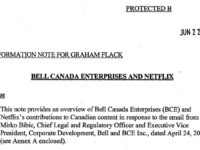Over the past several years, hundreds of thousands of Canadians have received notifications from movie and television interests threatening high-priced lawsuits unless they agreed to pay settlement fees. Moreover, a recent strategy led by the law firm Aird & Berlis has resulted in hundreds of actual legal filings against individuals, using a reverse class action strategy described as a “legal machine”. Yet despite the proliferation of lawsuits and demand letters, the head of the movie industry in Canada recently told the Standing Committee on Industry, Science and Technology that lawsuits against individuals were not part of their legal strategy.
Latest Posts
Government Memo Suggests Netflix Outspends Canadian Private Broadcasters on Canadian English Scripted Programming
Canadian Heritage Minister Melanie Joly view of cultural policy shifted gears in recent months with her emphasis on the need for all players to contribute and rhetoric on “no free rides”, a position that could lead to taxes on Internet services. While Netflix has been a popular target for many Canadian cultural organizations, according to documents released under the Access to Information Act, Canadian Heritage officials appear to have evidence that Netflix spends more on Canadian English-language scripted programming than the Canadian private broadcasters. The revelations come in a June 2017 internal memo to Graham Flack, the Canadian Heritage Deputy Minister, which respond to correspondence from BCE’s Mirko Bibic. Bibic met with Flack in April 2017 and was concerned with department comments about Netflix outspending Bell.
Unpacking Canada’s IP Strategy: Countering IP Abuse, Addressing IP Administration and Removing IP Barriers to Innovation
Navdeep Bains, Canada’s Minister of Innovation, Science and Economic Development, unveiled the government’s long-awaited intellectual property (IP) strategy, which responds to the need to increase IP awareness, develop new IP tools for businesses and counter IP misuse that harms both consumers and businesses. Following Bains’s announcement in April, the strategy garnered widespread applause for its holistic approach to IP policy, which recognizes the need to support IP through a combination of better information, administration and corporate practices.
The Consequences of High Wireless Costs: OECD Data Confirms Canadians Lag Behind in Data Usage
The OECD released the latest data on broadband usage this week highlighting yet again that the high costs of Canadian wireless services have real world consequences when it comes to consumer data usage. Earlier this month, Canadian Wireless Telecommunications Association President Robert Ghiz told an industry conference:
Consumption of mobile data – through all kinds of apps and every flavour of streaming content – continues to grow at an astounding rate in Canada. Mobile data traffic in our country increased by 41% between 2015 and 2016 alone.
Yet the OECD comparative data tells a far different story. First, OECD data indicates that Canada is at the low end of countries when measured by mobile broadband subscriptions per 100 inhabitants, ranking well below the OECD average and ahead of only six other OECD countries.
Canada’s Access to Information Open Data Fail: Departments Months Behind Posting Summaries of Completed Requests
The Liberal government has emphasized the importance of open data and open government policies for years, yet the government has at times disappointed in ways both big (Canada’s access-to-information laws are desperately in need of updating and the current bill does not come close to solving its shortcomings) and small (restrictive licensing and failure to comply with access to information disclosures).











